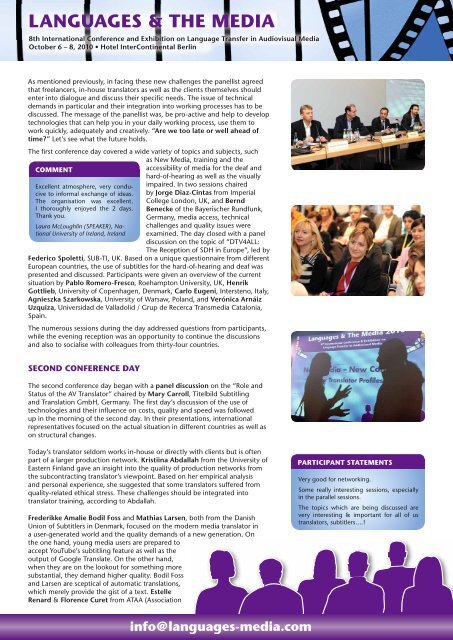Post-Conference Report 2010 (PDF) - Languages & The Media
Post-Conference Report 2010 (PDF) - Languages & The Media
Post-Conference Report 2010 (PDF) - Languages & The Media
Create successful ePaper yourself
Turn your PDF publications into a flip-book with our unique Google optimized e-Paper software.
LANGUAGES & THE MEDIA<br />
8th International <strong>Conference</strong> and Exhibition on Language Transfer in Audiovisual <strong>Media</strong><br />
October 6 – 8, <strong>2010</strong> Hotel InterContinental Berlin<br />
As mentioned previously, in facing these new challenges the panellist agreed<br />
that freelancers, in-house translators as well as the clients themselves should<br />
enter into dialogue and discuss their specifi c needs. <strong>The</strong> issue of technical<br />
demands in particular and their integration into working processes has to be<br />
discussed. <strong>The</strong> message of the panellist was, be pro-active and help to develop<br />
technologies that can help you in your daily working process, use them to<br />
work quickly, adequately and creatively. “Are we too late or well ahead of<br />
time?” Let’s see what the future holds.<br />
<strong>The</strong> fi rst conference day covered a wide variety of topics and subjects, such<br />
as New <strong>Media</strong>, training and the<br />
COMMENT<br />
Excellent atmosphere, very conducive<br />
to informal exchange of ideas.<br />
<strong>The</strong> organisation was excellent.<br />
I thoroughly enjoyed the 2 days.<br />
Thank you.<br />
Laura McLoughlin (SPEAKER), National<br />
University of Ireland, Ireland<br />
accessibility of media for the deaf and<br />
hard-of-hearing as well as the visually<br />
impaired. In two sessions chaired<br />
by Jorge Diaz-Cintas from Imperial<br />
College London, UK, and Bernd<br />
Benecke of the Bayerischer Rundfunk,<br />
Germany, media access, technical<br />
challenges and quality issues were<br />
examined. <strong>The</strong> day closed with a panel<br />
discussion on the topic of “DTV4ALL:<br />
<strong>The</strong> Reception of SDH in Europe”, led by<br />
Federico Spoletti, SUB-TI, UK. Based on a unique questionnaire from different<br />
European countries, the use of subtitles for the hard-of-hearing and deaf was<br />
presented and discussed. Participants were given an overview of the current<br />
situation by Pablo Romero-Fresco, Roehampton University, UK, Henrik<br />
Gottlieb, University of Copenhagen, Denmark, Carlo Eugeni, Intersteno, Italy,<br />
Agnieszka Szarkowska, University of Warsaw, Poland, and Verónica Arnáiz<br />
Uzquiza, Universidad de Valladolid / Grup de Recerca Transmedia Catalonia,<br />
Spain.<br />
<strong>The</strong> numerous sessions during the day addressed questions from participants,<br />
while the evening reception was an opportunity to continue the discussions<br />
and also to socialise with colleagues from thirty-four countries.<br />
SECOND CONFERENCE DAY<br />
<strong>The</strong> second conference day began with a panel discussion on the “Role and<br />
Status of the AV Translator” chaired by Mary Carroll, Titelbild Subtitling<br />
and Translation GmbH, Germany. <strong>The</strong> fi rst day’s discussion of the use of<br />
technologies and their infl uence on costs, quality and speed was followed<br />
up in the morning of the second day. In their presentations, international<br />
representatives focused on the actual situation in different countries as well as<br />
on structural changes.<br />
Today’s translator seldom works in-house or directly with clients but is often<br />
part of a larger production network. Kristiina Abdallah from the University of<br />
Eastern Finland gave an insight into the quality of production networks from<br />
the subcontracting translator’s viewpoint. Based on her empirical analysis<br />
and personal experience, she suggested that some translators suffered from<br />
quality-related ethical stress. <strong>The</strong>se challenges should be integrated into<br />
translator training, according to Abdallah.<br />
Frederikke Amalie Bodil Foss and Mathias Larsen, both from the Danish<br />
Union of Subtitlers in Denmark, focused on the modern media translator in<br />
a user-generated world and the quality demands of a new generation. On<br />
the one hand, young media users are prepared to<br />
accept YouTube’s subtitling feature as well as the<br />
output of Google Translate. On the other hand,<br />
when they are on the lookout for something more<br />
substantial, they demand higher quality. Bodil Foss<br />
and Larsen are sceptical of automatic translations,<br />
which merely provide the gist of a text. Estelle<br />
Renard & Florence Curet from ATAA (Association<br />
info@languages-media.com<br />
PARTICIPANT STATEMENTS<br />
Very good for networking.<br />
Some really interesting sessions, especially<br />
in the parallel sessions.<br />
<strong>The</strong> topics which are being discussed are<br />
very interesting & important for all of us<br />
translators, subtitlers….!




